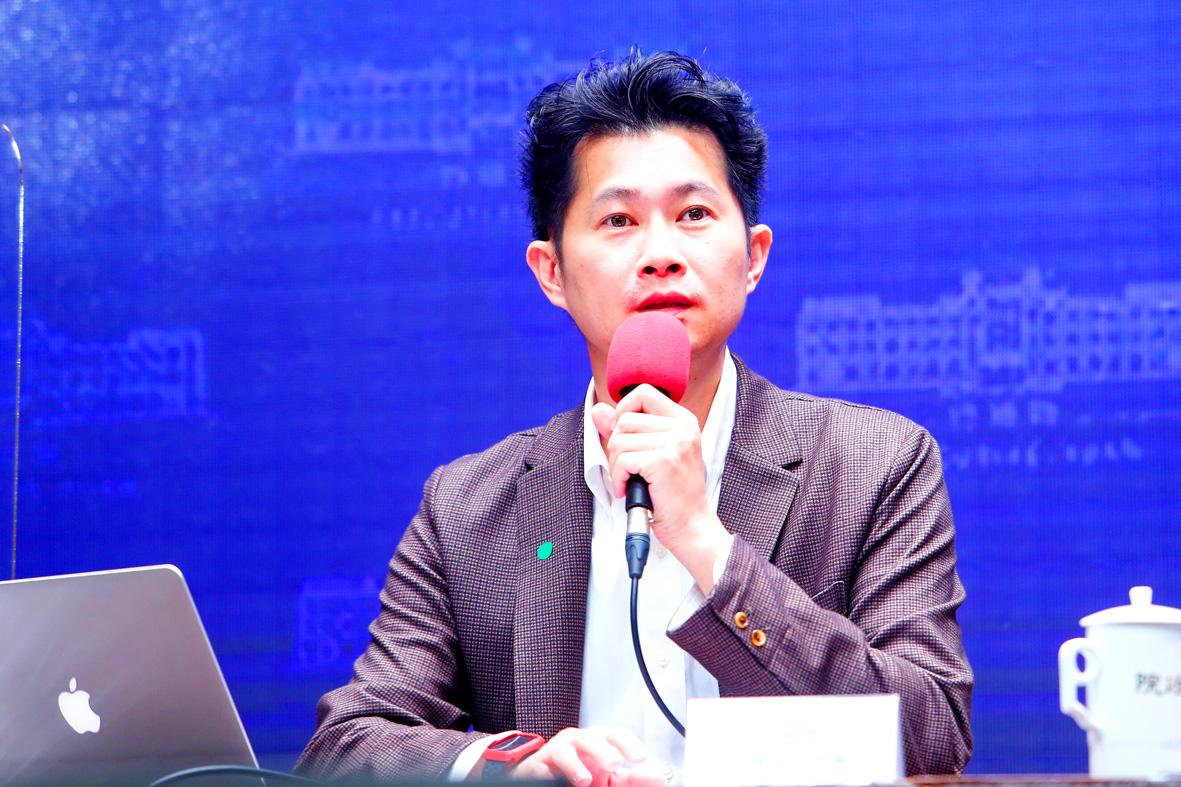Maximum spending on the second phase of the Cabinet’s Forward-looking Infrastructure Development Program was set at NT$510 billion (US$17.24 billion) after the Legislative Yuan yesterday approved a funds ceiling, which was bolstered by NT$90 billion left over from the first phase.
Premier Su Tseng-chang (蘇貞昌) said at the Executive Yuan in Taipei that ministries should comply with requests from the National Development Council (NDC), the Directorate-General of Budgeting, Accounting and Statistics (DGBAS) and others to complete a detailed financial plan by the middle of this month.
The program, initiated on July 7, 2017, is to facilitate infrastructure for transportation, hydraulic engineering, green energy, smart technology, balancing advancements in urban and rural areas, as well as improved facilities for raising children, food safety and fostering talent, the NDC Web site says.

Photo: CNA
Ministries should be careful about budget allocations, and improve collaboration and mutual understanding, Su said.
The first phase of the project was given NT$420 billion from September 2017 to August next year, but NT$90 billion is yet to be allocated.
According to the Special Act on the Forward-looking Infrastructure Development Program (前瞻基礎建設特別條例), funding for the second phase should only be allotted after a legislative review, and should not exceed the ceiling or scale of the first phase.
In related news, Su said that he instructed the Ministry of Economic Affairs to accelerate the introduction of 5G networking and adoption of artificial intelligence systems.
The ministry briefed Su on its plans to make Taiwan a hub for advanced manufacturing and semiconductor engineering.
Service providers this week announced the commencement of 5G services in Taiwan.
If the nation becomes self-sufficient in semiconductor production, and research and development of related technology, it could become a major link in the global supply chain, which would increase incentives for foreign investment and bolster firms’ competitiveness, Su said.
The local semiconductor industry should seek to be self-sufficient in materials production, and in research and development of technology and equipment, he said.
The output value of the nation’s semiconductor industry last year was NT$2.7 trillion, the second-highest globally, the ministry said.
Last year, demand for semiconductor equipment in Taiwan was valued at NT$513 billion, or 28 percent of global demand, while demand for semiconductor products was NT$330.6 billion, or 22 percent of global demand, the ministry said.
It pledged to enlarge the nation’s semiconductor manufacturing capabilities and to attract more foreign investment to the industry.
It is optimistic that the value of the Taiwanese semiconductor industry would be NT$5 trillion by 2030 once it has achieved complete self-sufficiency, the ministry said.
Additional reporting by CNA

Taipei and New Taipei City government officials are aiming to have the first phase of the Wanhua-Jungho-Shulin Mass Rapid Transit (MRT) line completed and opened by 2027, following the arrival of the first train set yesterday. The 22km-long Light Green Line would connect four densely populated districts in Taipei and New Taipei City: Wanhua (萬華), Jhonghe (中和), Tucheng (土城) and Shulin (樹林). The first phase of the project would connect Wanhua and Jhonghe districts, with Chiang Kai-shek Memorial Hall and Chukuang (莒光) being the terminal stations. The two municipalities jointly hosted a ceremony for the first train to be used

MILITARY AID: Taiwan has received a first batch of US long-range tactical missiles ahead of schedule, with a second shipment expected to be delivered by 2026 The US’ early delivery of long-range tactical ballistic missiles to Taiwan last month carries political and strategic significance, a military source said yesterday. According to the Ministry of National Defense’s budget report, the batch of military hardware from the US, including 11 sets of M142 High Mobility Artillery Rocket Systems (HIMARS) and 64 MGM-140 Army Tactical Missile Systems, had been scheduled to be delivered to Taiwan between the end of this year and the beginning of next year. However, the first batch arrived last month, earlier than scheduled, with the second batch —18 sets of HIMARS, 20 MGM-140 missiles and 864 M30

Representative to the US Alexander Yui delivered a letter from the government to US president-elect Donald Trump during a meeting with a former Trump administration official, CNN reported yesterday. Yui on Thursday met with former US national security adviser Robert O’Brien over a private lunch in Salt Lake City, Utah, with US Representative Chris Stewart, the Web site of the US cable news channel reported, citing three sources familiar with the matter. “During that lunch the letter was passed along, and then shared with Trump, two of the sources said,” CNN said. O’Brien declined to comment on the lunch, as did the Taipei

A woman who allegedly attacked a high-school student with a utility knife, injuring his face, on a Taipei metro train late on Friday has been transferred to prosecutors, police said yesterday. The incident occurred near MRT Xinpu Station at about 10:17pm on a Bannan Line train headed toward Dingpu, New Taipei City police said. Before police arrived at the station to arrest the suspect, a woman surnamed Wang (王) who is in her early 40s, she had already been subdued by four male passengers, one of whom was an off-duty Taipei police officer, police said. The student, 17, who sustained a cut about